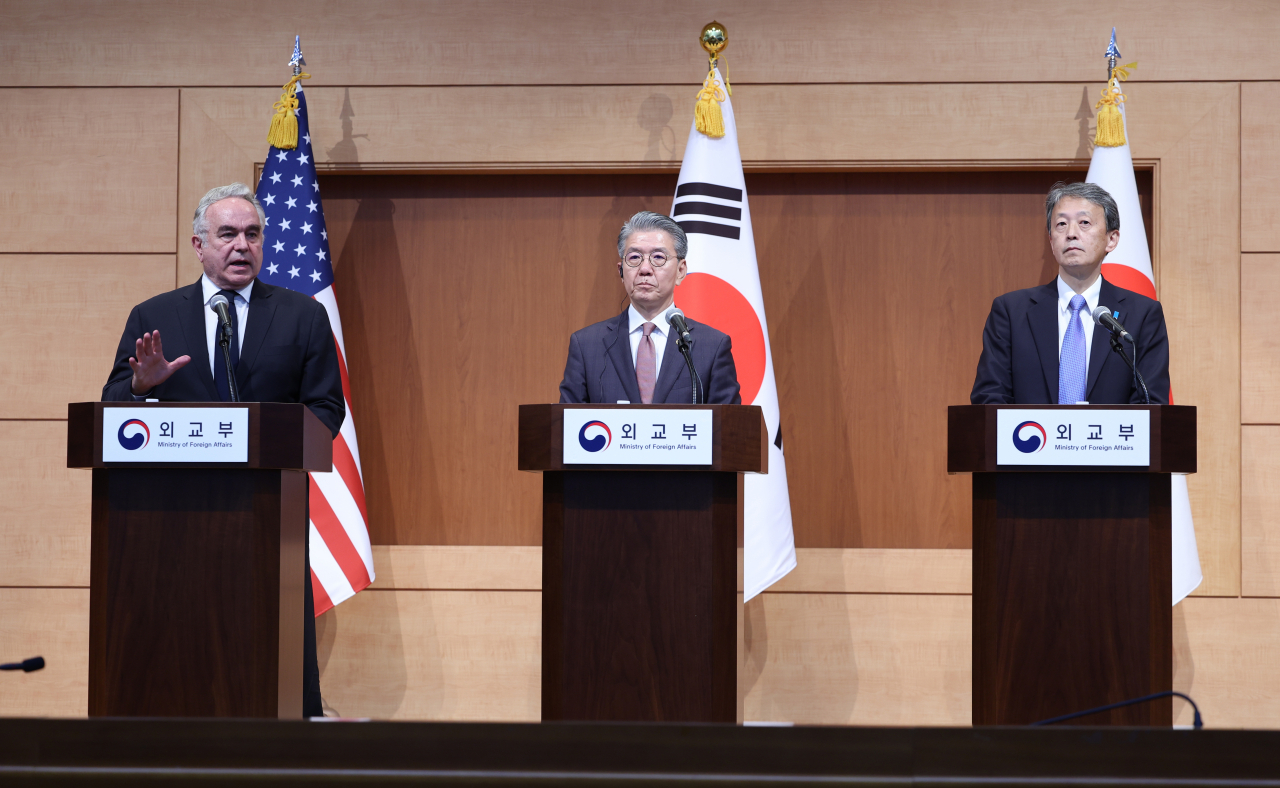 |
US Deputy Secretary of State Kurt Campbell (left) speaks during a joint press conference with his South Korean and Japanese counterparts, First Vice Foreign Minister Kim Hong-kyun (center) and Japanese Vice Foreign Minister Masataka Okano, respectively, after their trilateral meeting at the foreign ministry in Seoul, on Wednesday. (Yonhap) |
South Korea, the United States and Japan have agreed to coordinate their responses to North Korea's recent escalating provocative steps targeting South Korea, based on a shared assessment of the current situation on the Korean Peninsula, US Deputy Secretary of State Kurt Campbell said Wednesday.
Campbell said South Korean First Vice Foreign Minister Kim Hong-kyun and Japanese Vice Foreign Minister Masataka Okano "were able to conduct a deep and sustained review of the situation on the Korean Peninsula" over the course of the afternoon during the trilateral foreign ministerial meeting in Seoul.
The meeting took place notably just one day after North Korea blew up the Gyeongui and Donghae line roads -- key inter-Korean road and rail routes in its eastern and western regions -- 10 meters from the Military Demarcation Line. Pyongyang also continued its accusations that the South Korean military had sent drones into its airspace on three occasions in early October under the cover of night, threatening military action against South Korea in response.
"I'm pleased to report that our three nations are fully aligned with respect to how we see the situation and how we propose to proceed accordingly," Campbell told reports during a news conference following the three-way meeting at the Foreign Ministry building in Seoul.
"I want to underscore that we are alarmed by the provocative steps that the DPRK has taken across many arenas in terms of missile activities, nuclear provocations and increasing activities with Russia in Ukraine. But at the same time, we want to commend the ROK for the steady, careful, measured and statesman-like approach that they have taken to repeated DPRK provocations," he said.
The ROK and the DPRK stand for the official names of South Korea and North Korea, respectively: the Republic of Korea and the Democratic People's Republic of Korea.
Okano said, "We exchanged candid views on North Korea’s recent developments and agreed to respond in a coordinated manner among the three countries."
Kim said he, Campbell and Okano "strongly condemned North Korea’s continued nuclear missile threats, deliberate actions to escalate tensions including the complete severance of inter-Korean land routes, the so-called southern border blockade, and claims of drone infiltration."
"We agreed to respond firmly to any provocations from North Korea while maintaining a rock-solid South Korea-US combined defense posture. Furthermore, we committed to strengthening security cooperation under close coordination among South Korea, the US and Japan."
The diplomats voiced ongoing concerns over recent reports that North Korea has deployed troops to assist Russia in its invasion of Ukraine with Kim saying that the three had an "in-depth discussion" on Ukraine issues.
Kim said, "We are well aware of the reports regarding North Korea sending troops to Russia," reiterating the Yoon Suk Yeol government's consistent calls for Russia to immediately halt illegal military cooperation with North Korea.
"If these reports are true, it would mean that North Korea is not only providing shells and missiles to Russia but is also directly participating in the war, which would be a very serious matter."
Campbell also declined to confirm whether North Korean troops have been deployed to the battlefield against Ukraine.
"I can report that we do see signs of enhanced DPRK materials support to Russia, which is being felt on the battlefield both artillery shells and missiles," he said.
"There are reports of further activities including personnel. I think we are still evaluating those reports. We are concerned by them and as I said I think we agreed that we will continue to monitor the situation closely," Campbell said.
In a video message to the public on Monday, President Volodymyr Zelenskyy accused North Korea of "actual involvement in the war."






![[Herald Interview] How Gopizza got big in India](http://res.heraldm.com/phpwas/restmb_idxmake.php?idx=644&simg=/content/image/2024/11/20/20241120050057_0.jpg)
